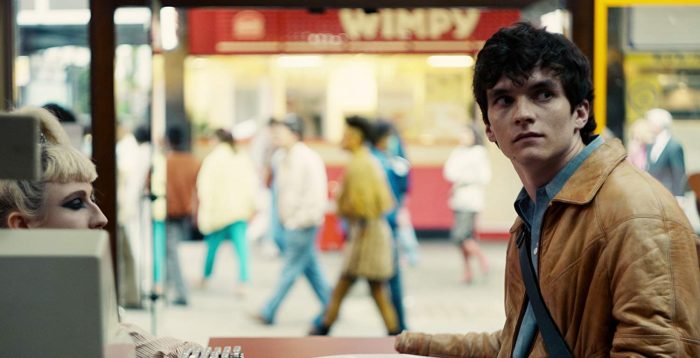‘Black Mirror: Bandersnatch’ Review: Netfix’s Choose-Your-Own Adventure Experiment is Entertaining Enough – At Least the First Time Through

Black Mirror: Bandernatch is probably (hopefully) the closest we’ll come to living through a Black Mirror episode — and that’s not as bad as it sounds. Black Mirror: Bandersnatch is a choose-your-own adventure story that makes the viewer culpable for the doomed destiny of its protagonist: a young programmer named Stefan Butler (Dunkirk‘s Fionn Whitehead) who attempts to adapt a sprawling fantasy novel into a video game in 1984. But as he dives deeper into developing his game, itself a choose-your-own-adventure game set to revolutionize the industry, his mental state begins to dangerously unravel.
It’s a cautionary techno-tale typical of the bleak anthology series created by Charlie Brooker. But rather than allowing its audience to be a distant, apathetic voyeur, Black Mirror: Bandersnatch makes the viewer part of the experience, offering up various binary choices throughout the film that can change the story — sometimes to drastic effect. The result is an entertaining, and at times thrilling, immersive experience that transforms a gimmick into a game, and simultaneously compels and condemns the viewer for daring to be involved.
Bandersnatch has made headlines for its choose-your-own-adventure story structure, a storytelling gimmick that became popular in children’s books in the ’70s and ’80s but never really evolved beyond its charming childish roots. Other than video games where choice becomes the rule apparent, choose-your-own-adventure in its purest form was never truly possible in other mediums like movies and TV. But thanks to new technology implemented by Netflix, Black Mirror has made an interactive feature film that is effectively the antithesis to everything that film stands for. But in this decade, where movies have already become television and comic books, why not video games?
Part personality test, part screenwriting experiment, part meta-commentary on Black Mirror‘s pop culture impact itself, Black Mirror: Bandersnatch game-ifies the movie-watching experience into what feels like the next-step evolution of the sci-fi horror series. The viewer gets to make a choice frequently throughout the film, the first of which takes place merely five minutes into the film: Frosted Flakes or Sugar Puffs? Eventually the mundane choices grow into mammoth, world-ending choices, each taking you to one of at least five alternate endings. The choices you make can reveal your personality (are you a white hat or a black hat?) or how familiar you are with storytelling tropes (does choosing to accept or refuse the job offer make for a more compelling story?).
Yeah, it’s not really a movie, but it is fun. Bandersnatch takes a passive viewing experience and makes it active, making the viewer responsible for poor Stefan’s life, and even communicating with him as his mental state further deteriorates. It’s the godlike omnipotence of playing The Sims, nestled into a Black Mirror exploration of alternate universes created from every choice we make.
But Bandersnatch‘s ruminations on free will would becomes quickly tiresome if it weren’t for the cheeky meta-asides and — yes — Easter Eggs inserted into the film. The Netflix storyline — in which the viewer gets the chance to explain to Stefan what a streaming service is — is a funny, tongue-in-cheek piece of corporate synergy that doubles as the meta-commentary on technology that Black Mirror just loves to hammer in. Another subplot involving the eccentric video game programming prodigy Colin Ritman (a magnetic Will Poulter, doing his best Brad Pitt in Fight Club) has Stefan going on a surreal drug trip where Colin literally describes all the major alternate endings. And several times throughout the film, the characters will over-emphasize the themes of choice, such as Stefan’s therapist (Alice Lowe) opining, “The past is immutable. No matter how painful it is we can’t change things we can’t choose differently with hindsight.” It’s dangerously on-the-nose, but then again, when isn’t that the case for a Black Mirror episode?
There are no wrong choices for Black Mirror: Bandersnatch — the only mistake you can make is really not to choose at all. When you let the film play straight through without rising to its prompts to make a choice, Bandersnatch eventually takes you through all five major alternate endings, which instantly zaps the fun from the experience. It becomes apparent how thinly plotted the film is when you experience all the somewhat derivative endings back-to-back. There, that ending is ripped straight from Perfect Blue; another ending offers shades of Netflix’s other ’80s set series, Stranger Things. Many of the endings featuring the cheery talk show become progressively absurd to the point that they feel like joke storylines that Brooker, who wrote the episode, threw together on a lark.
The first time I “played” Bandersnatch, I had a blast; the second time I watched the entire thing all the way through, I was bored. By not treating Bandersnatch as a game, the film is exposed as an over-long, overly simplistic Black Mirror episode. The appeal is in the choices, or in the words of Bandersnatch‘s Colin, the illusion of choice.
/Film Rating: 6 out of 10
The post ‘Black Mirror: Bandersnatch’ Review: Netfix’s Choose-Your-Own Adventure Experiment is Entertaining Enough – At Least the First Time Through appeared first on /Film.
from /Film http://bit.ly/2rZZdDF
via IFTTT
Comments
Post a Comment